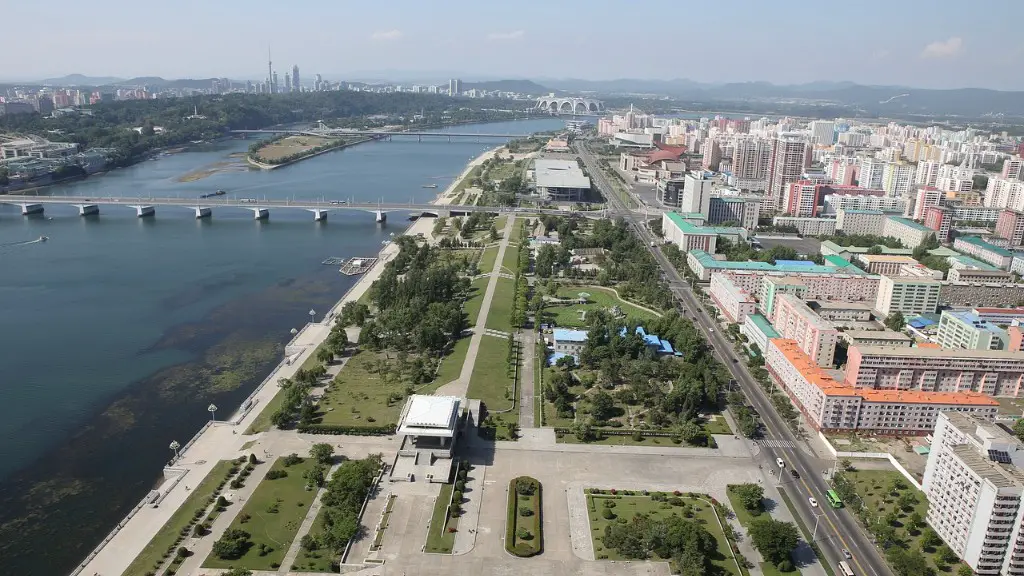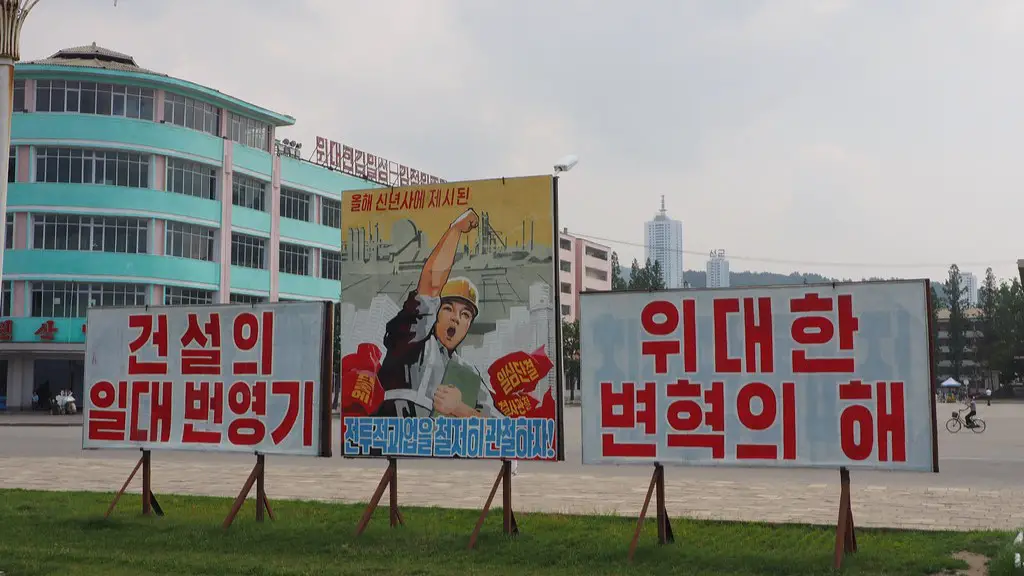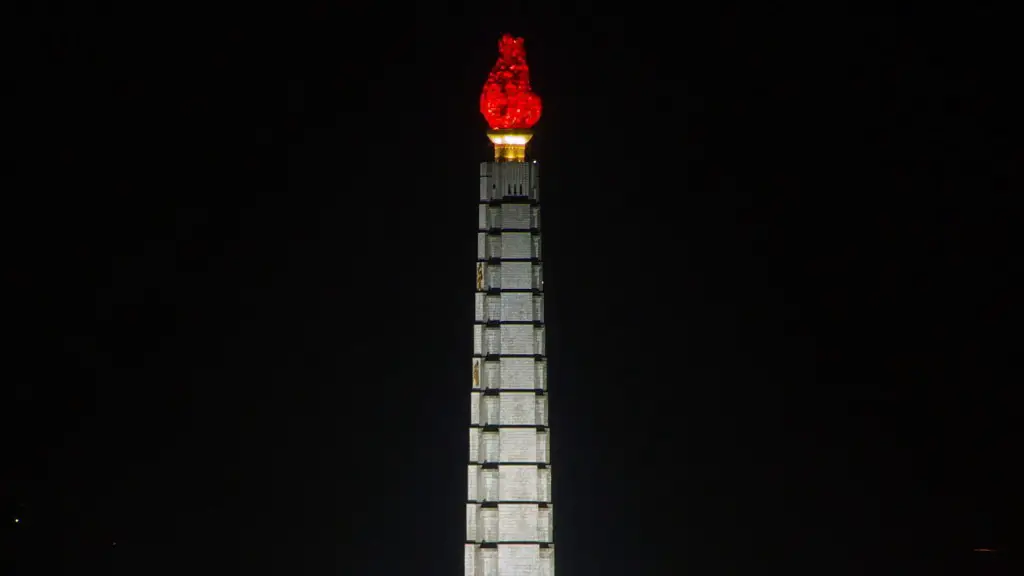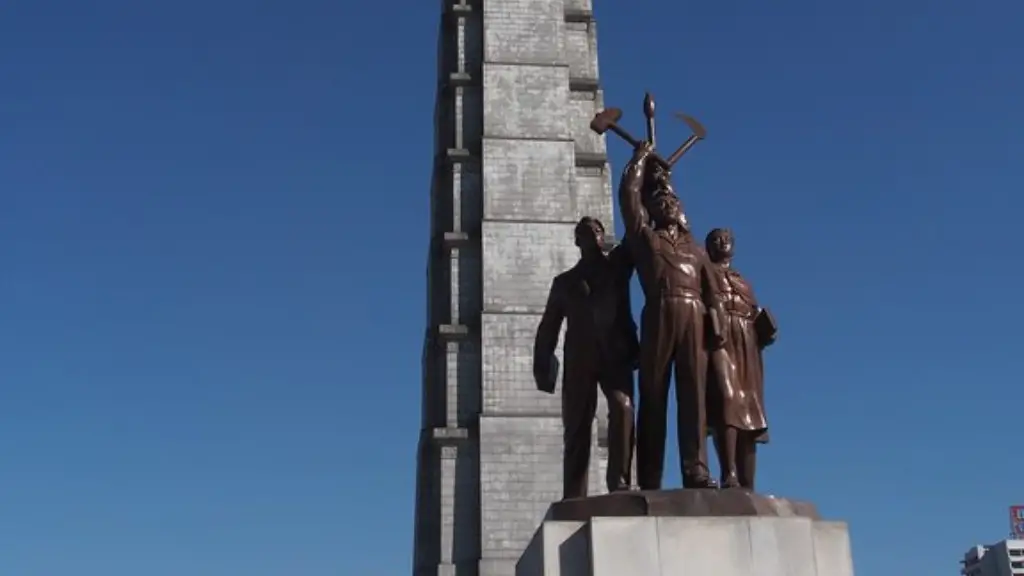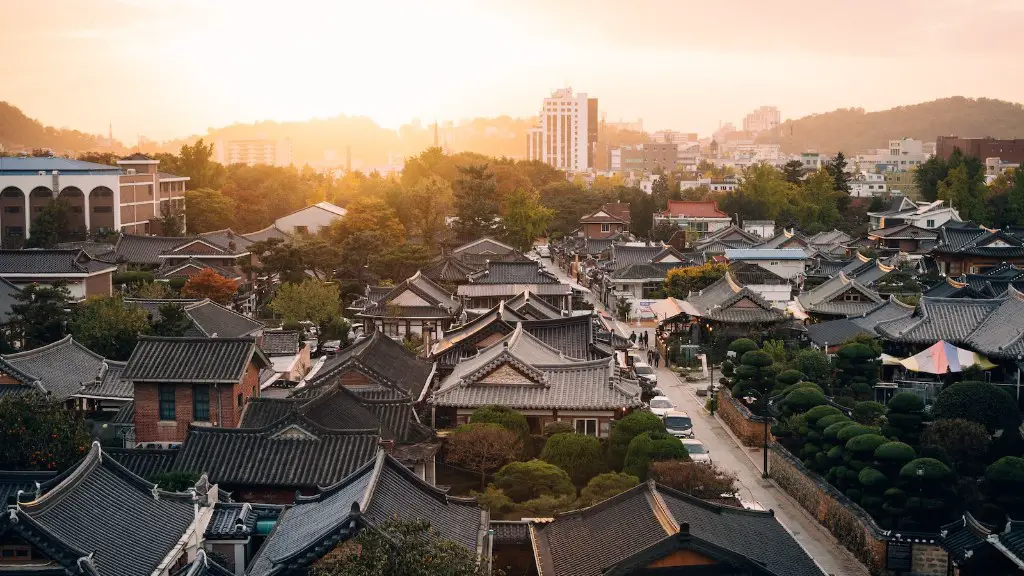North Korea, officially known as the Democratic People’s Republic of Korea, is an East Asia country located on the northern side of the Korean Peninsula. It is one of the most isolated countries in the world, with very limited access to the outside world. North Korea is bordered by China and Russia to the north, South Korea to the south, and the Sea of Japan to the east. North Korea’s geographic location places it firmly in East Asia and strengthens its longstanding status as a pariah nation in the international community.
From an economic perspective, the country is highly centralized and heavily reliant on state-owned enterprises and agriculture. The economy has long been in decline, due largely to rigid state control over the production and distribution of goods, as well as rampant mismanagement. In addition, the country is subject to multiple international sanctions, which have further exacerbated its economic woes. North Korea’s economy has been described as a “command economy” due to its top-down control of production and resource allocation.
Political experts have long argued that North Korea’s geographic position impacts its foreign policy in a number of ways. Given the country’s proximity to the two military superpowers China and Russia, North Korea has traditionally crafted its foreign policy around maintaining the support of its two neighbors. This strategy has allowed the country to remain largely immune to international pressure.
Moreover, North Korea’s geographic location and its stance on foreign policy have been factors in its long-standing nuclear weapons program. Since the end of the Cold War, the secretive state has sought to expand its nuclear capabilities in order to increase its regional and international power. This strategy has been viewed with trepidation by its neighbors, as well as the wider international community.
From a cultural perspective, North Korea’s geographic location has also shaped its identity. Straddling the ethno-linguistic border between the North Chinese, Korean and Japanese cultures, North Korea has developed its own distinct identity. This includes a unique language, food and art, as well a deep sense of nationalism and pride.
In conclusion, North Korea’s geographical location has had a profound impact on its political, economic, and cultural development. For better or worse, the country’s position in East Asia has been a major factor in shaping its current status as a reclusive, heavily sanctioned state.
North Korea’s Economy
The North Korean economy can best be described as a centrally planned command economy. Controlled by the Communist state, the country’s economic output and resource allocation are heavily managed from the top-down. The country’s main economic activities include agriculture, light manufacturing, and mining. The output from these industries is distributed via the state’s non-market system. This involves the government allocating resources to firms and households on the basis of need and priority.
The country’s economy has suffered considerably in recent decades due to multiple international sanctions and rampant mismanagement. In addition, its isolationist foreign policy has seen it remain largely untouched by economic progress and globalization, creating economic stagnation and declining standards of living. This has led to the emergence of a significant informal economy, and the emergence of private markets in the country.
Moreover, the country has sought to maintain some level of economic self-sufficiency by relying on domestically produced goods. This has seen the introduction of the country’s own currency, the won, in 2009. The won’s circulation has been largely limited to the local markets and foreign trading partners, with the US dollar remaining the preferred currency for international transactions.
In conclusion, the North Korean economy can best be described as heavily centralized and unable to compete with the global market. Its isolationist foreign policy and rampant mismanagement have led to poor economic performance and declining standards of living. Despite the need for reform, North Korea’s geographic location limits the ability of the country to adopt a more market-oriented approach.
Political Climate in North Korea
The political climate in North Korea is characterized by the highly oppressive authority of the ruling Kim dynasty and its totalitarian government. The government has long sought to maintain a tight grip on power while limiting access to the outside world. Consequently, the country has been described by political experts as one of the most authoritarian countries on Earth.
The government maintains an iron grip on all aspects of the country, from the economy to the public’s access to media and information. This includes the use of political repression, censorship, and surveillance. Moreover, the government has been known to employ a number of other tactics to maintain control, such as the use of secret police forces and extreme propaganda campaigns.
North Korea has also sought to maintain its regional power and influence by developing and testing nuclear weapons. This strategy has been met with strong opposition from the international community, who have argued the country’s nuclear weapons pose a grave threat to regional and global security.
In conclusion, North Korea’s geo-political positioning has been central to its highly authoritarian political culture and nuclear ambitions. The highly oppressive rule of the Kim dynasty and its highly centralized government have created an environment that limits the country’s access to the outside world, as well as its ability to expand its economy and influence.
North Korean Culture
The culture and customs of North Korea are heavily influenced by its geographic location and historical ties to neighboring countries. Straddling the ethno-linguistic border between the North Chinese, Korean, and Japanese cultures, North Korea has developed its own distinct national identity. This includes a unique language, food and art, as well as a strong sense of nationalism and pride.
North Korea’s cultural heritage has been heavily shaped by its close ties to China and Japan. In particular, the country’s isolationist foreign policy has seen the development of a unique set of cultural norms and customs. This includes the widespread adoption of Confucianism as the dominant ideology. Moreover, the country’s long-standing adherence to traditional Korean dress and cuisine has further contributed to the development of its distinct national identity.
The country’s main religion is a mix of traditional religion and Christianity, as well as elements of shamanism and Buddhism. Moreover, the national ideology of juche, or self-reliance, is highly valued and is used to reinforce allegiance to the ruling regime.
In conclusion, North Korea’s geographic location and historical ties to its neighbors have been central to shaping its distinct national identity. Its strong sense of nationalism, traditional dress, and cuisine remain highly valued and are integral to the country’s cultural heritage.
Impact of Sanctions on North Korea
North Korea has long been subject to multiple rounds of international sanctions in response to its nuclear weapons program and human rights violations. The sanctions have been drafted in order to limit the country’s access to foreign goods and services, as well as curb its ability to access the global financial system. Moreover, the sanctions have been seen as an important tool for pressuring the government to adhere to international standards of human rights and nuclear non-proliferation.
The sanctions have had a major effect on North Korea’s economy, with a reported reduction in GDP growth and a decline in living standards. The country has also seen a decrease in its access to food and essential goods, as well as an uptick in public dissent. Despite these challenges, North Korea has remained largely immune to the impact of the sanctions due to its close relationships with China and Russia.
Moreover, the sanctions have not made a major impact on North Korea’s nuclear program, which has continued to expand despite being targeted by United Nations Security Council resolutions. This has led political experts to conclude that the sanctions alone will not be effective in curbing North Korea’s nuclear ambitions.
In conclusion, the sanctions imposed on North Korea have had a major impact on the country’s economy and living standards. However, the sanctions have so far failed to make a major impact on the government’s nuclear program, suggesting that a different approach may be needed to effectively curb the country’s ambitions.
North Korea and Its Neighbors
North Korea has a long and complicated relationship with its neighbors, particularly South Korea and Japan. The two countries have frequently clashed over their claims to the Korean Peninsula, resulting in a series of short wars and border skirmishes. North Korea has also sparred with the United States, who has long sought to curtail the country’s nuclear ambitions.
Despite the animosity between the two countries, North and South Korea have maintained a truce since the end of the Korean War in 1953. In addition, the two sides have signed a number of peace agreements and taken steps towards economic cooperation. This has included the construction of an industrial park in the Northern part of the peninsula, as well as the 9th Round of Inter-Korean Talks in 2009.
North Korea has also sought to maintain close relationships with China and Russia, who have long been supportive of the regime. The country’s close ties to the two countries have insulated it from international pressure and enabled it to maintain its nuclear weapons program.
In conclusion, North Korea has a complex relationship with its neighbors, particularly in regards to South Korea and Japan. Despite the animosity between the two countries, North and South Korea have pushed for economic cooperation and signed a number of peace agreements. Additionally, the country’s close ties to China and Russia have enabled it to maintain its nuclear weapons program.
